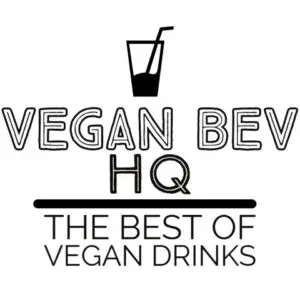Is Beer Vegan? It may be 5,500 years old, but is beer vegan? Yes, is beer vegan? Is that (most often) golden (and sometimes bubbling) liquid vegan? In this article we are going to break down everything you need to know about beer and whether it is vegan or not. We will list the main producers which are and aren’t vegan and what you have to look for in premium beers to make sure you know exactly what you are drinking. So, sit down grab yourself a six-pack, a pint, a brew, a larger, or some pale ale, and get ready to find out if that beer you love to drink is vegan or not.

Is Beer Vegan?
As a general rule, beer is usually vegan. In fact, it is the opposite of the wine industry. Most wines are not vegan, whereas most beers are vegan. This is true for most of the mainstream beers as well.
If you are interested in Wine, we also wrote a whole article about the vegan-ness of wine. You can read it here: Why Is Wine Not Vegan?
Why “Is Vegan Beer” An Important Question
The reason “Is Beer Vegan?” is an important question is because as a species we consume a whole load of the stuff. In the US the average consumption per adult over 21 is around 28.2 gallons per person, per year (see Beer Consumption by State per Capita in the USA (beerinfo.com)). That is roughly one six-pack per person per week. Think that is a lot? Well, that is nothing compared to our friends in the Czech Republic. For the last 26 years, the Czech Republic has held the top spot in beer consumption per person a whopping 49.7 gallons per person per year (List of countries by beer consumption per capita – Wikipedia).
If you are interested in global beer consumption facts you can check out this Yahoo article (10 Countries That Consume the Most Beer in 2020 (yahoo.com)) on the topic.
Given how much beer we consume, it got us thinking is this alcoholic beverage we love vegan? Is Beer Vegan?
Vegan Beer – Is Beer Vegan?
As a general rule, beer is vegan. The basic ingredients of beer are just: water, malt, hops, and yeast. The brewing process isn’t even that complicated. Wikipedia describes it as such:
“The basic ingredients of beer are water; a starch source, such as malted barley, able to be saccharified (converted to sugars) then fermented (converted into ethanol and carbon dioxide); a brewer’s yeast to produce the fermentation and a flavoring such as hops.”
In fact, in Germany, The German Purity Law (also known as Reinheitsgebot) of 1516 states that beer can only be made from these four ingredients: water, malt, hops, and yeast and it is these four ingredients are that most beer makers still stick to today.
What Makes Beer Not A Vegan Beer?
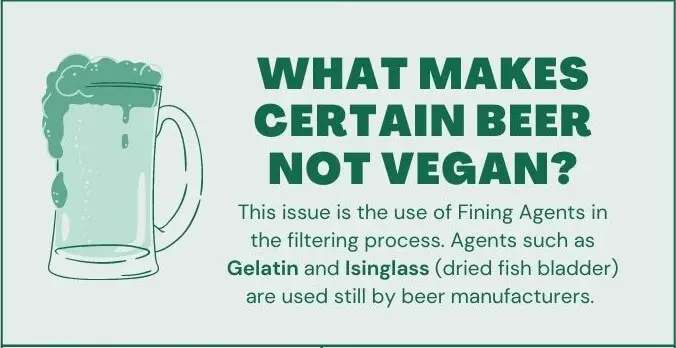
To understand what makes beer not vegan you need to understand the brewing process which is essentially 4 steps: Prepare, Bew, Ferment, and Bottle. To make beer you start by mixing your water, malt, and hops together and heating to create your wort (the stuff that is going to get fermented). You then cool and ferment by adding yeast. Seal it up and let the fermentation get to work. Next, you filter your beer and then you finally bottle it. That is beer-making 101.
The issue is in the filtering process. You see once the fermentation is complete your beer most often will be cloudy. This is because hops leave polyphenols in the beer and yeast creates a hazy effect which can cause a lack of clarity. Brewers will then use fining agents that clump together unwanted molecules in the beer, which then sink to the bottom into larger easily removable clumps. The result is a clear and smooth beer with any bitter edges taken off.
Is Beer Vegan – The Issue for Vegan Beer?
The most common fining agents used in the beer industry are Isinglass (dried fish swim bladders) or Gelatin. Neither are vegan.
- Gelatin – is the most aggressive of the fining agents but is definitely not vegan. You see gelatin is a source of collagen extracted from the skin, bones, and connective tissue of animals;
- Isinglass – this is another form of gelatin used primarily in wine whites. It helps clarify wine to the clear white color we all love. However, it is not vegan as it is obtained from dried swim bladders of fish.
Those are the most common, but also milk proteins (Caseins) and Albumen (a protein from egg whites) can also be used. The result is that anywhere these types of fining agents are used will make any vegan brew automatically non-vegan. Urgh.
Does Beer Need To Be Fined for Vegan Beer?
The good news is that beer does not need to be filtered using fining agents. Most larger brewers will filter their beer using polishing filtration by chilling the beer overnight to separate the “chill haze” and then using pressure to filter the beer from one keg to another. This kind of setup is more expensive, hence why a lot of smaller brewers must use fining agents. Also, hazy beers are becoming more popular, leading a lot of brewers to focus less on fining and filtering their beer.
Whatever the beer maker’s preference, the fact remains there are vegan-friendly fining agents such as Irish Moss (a seaweed-derived fining agent) or PVPP powder (also known as Polyvinylpolypyrrolidone) is a synthetic fining agent often used in the wine industry.
Is Beer Vegan – Non-Fining Issues for Vegan Beer
You should also be aware of some non-fining-related issues.
- Glycerin: glycerin is sometimes added to beer as a preservative and to add a foam “head” to the beer. The glycerin can come from a variety of sources: animal-based, plant oils, or a mix of both.
- Lactose: this is traditionally added to milk stouts to give them an extra sweetness from the added milk sugar.
- Honey: some brewers will add honey to their brew for flavor. But there are also things such as Mead (a honey ale which is technically not beer) and “Braggot” (a hybrid between Mead and Ale).
Is Beer Vegan – How can I tell a Vegan Beer?
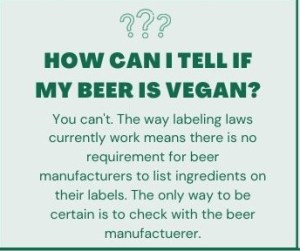
You can’t. Yep, you read that right. You can’t 100% be sure that your beer is vegan. That is because labeling laws, like in the wine industry, do not require beer producers to label ingredients. Don’t believe us just grab your bottle of beer and turn it around. The only limited exceptions are beers that do not have malted barley – these ones are required to list standard nutritional facts and ingredients. Also, low-calorie beers will be required to list nutritional information if they decided to list their calorie content.
Other than that, listing ingredients is completely, utterly, and entirely optional for all alcoholic beverages. This includes allergens such as nuts, eggs, etc. The only exception is if the brewer adds sulfites or certain dyes.
If you want a detailed breakdown of all the nuances of alcohol labeling this article on VOX from 2015 is a great piece – VOX, This is why alcohol doesn’t come with nutritional facts.
The only way to be certain that your beer is vegan is to check with the company. However, with veganism becoming more mainstream and people wanting to know what is in their drink more companies are embracing labeling their beer as “plant-based” or “vegan friendly” on their labeling.
But, there are some good rules of thumb to follow:
General rules of thumb – how to tell if Your Beer Vegan
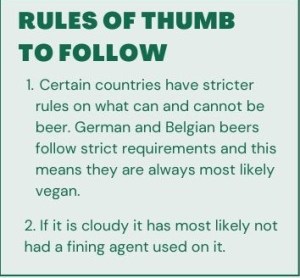
- Certain countries have much stricter rules on what can and cannot be beer. German and Belgian beers for example must follow exact legal requirements and certain ingredients to even be called a beer. This means they are mostly always vegan.
- Cloudy Beer: If your beer is cloudy it has most likely not had a fining agent added to it.
Vegan Beers
Okay, now for something actually helpful. Below is a list of the mass-producing brewers which are currently, at the time of writing, known to be Vegan and which are not. If in doubt, always check the manufacturer’s site. For example, Fosters states on its FAQs that it is not vegan.
Mass-produced Vegan Beers:
- Budweiser and Bud Light (USA) *except the Budweiser Clamato Chelada is not vegan.
- Coors and Coors Light (USA) *except Coors Light in the UK, which is not vegan.
- Miller Original and Genuine Draft (USA)
- Miller Lite (USA)
- Samuel Adams Boston Lager (USA)
- Pabst Blue Ribbon (USA)
- Carlsberg (Danish)
- Cobra (UK and India)
- Guinness (Ireland)
- Grolsch (Netherlands)
- Heineken (Netherlands)
- Hoegaarden (Belgium)
- Stella Artois (Belgium)
- Tennents (Scotland)
- Peroni (Italy)
- San Miguel (Spain)
- Beck’s (Germany)
- Sapporo (Japan)
- Corona (Mexico)
- Pacifico (Mexico)
- Skol (Brazil)
- Tsingtao (China)
- Snow (China)
- Harbin (China)
If you want a fully comprehensive list PETA and VegNews both have excellent comprehensive lists of vegan beers we like to refer to. Bookmark them now.
Is Beer Vegan? – The Final Sip
David Rains Wallace said, “fermentation may have been a greater discovery than fire”. And, it is not something we disagree with. Beer in its natural simplest form sustained us when things like drinking water would have killed us.
Beer is a living contradiction. Metaphorically it is more than just water, malt, hops, and yeast – but in reality, it shouldn’t really be anything more than just that. In the quest for easier, cheaper, and faster production we may have compromised on a recipe that is as old as humankind. A recipe that in some places is so revered that it is protected by the very laws of the land. But things are changing. People are changing. Whether you are vegan or not we care about what we drink, and what goes into our beloved brews. The industry is changing and whether you are vegan or not this can only be a good thing, right?
So, to answer your question: “is beer vegan?” – there is no reason it shouldn’t be, but for the most part, yes, yes, beer is vegan. But, if in doubt always double-check – now that truly is the unofficial mantra of being vegan.
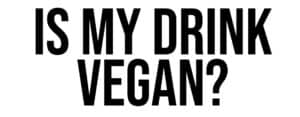
…now you know.
Beverage makers may change ingredients and/or manufacturing processes. Always double-check ingredients before purchasing any beverages.
Please Drink Responsibly.
Like What You Are Reading?
Like this article, want to find out more? Want to know what beers you exactly need to avoid as a vegan, or the best vegan beers to find at Trader Joe’s? Then check out some of my other articles below:
General
- Is Alcohol Vegan? How To Know The Truth
- Vegan Alcoholic Drinks – List of Vegan Alcoholic Brands You Need To Know
- What Alcoholic Drinks Are Not Vegan? The Complete Guide
Beer
